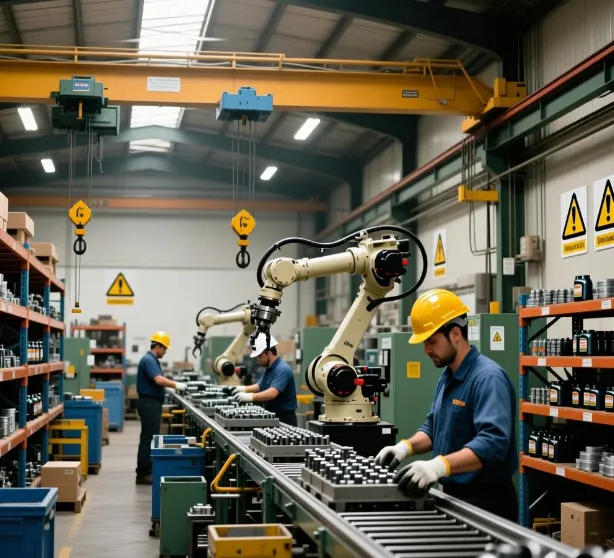Industrial Process Pumps: Core Conveying Equipment in Modern Production
Efficient and reliable industrial pump solutions for diverse needs in general industrial fields
Industrial Process Pump Types and Technical Parameters
Single-Stage Centrifugal Pump
Features and Applications:
- Wear-resistant open impeller design with low axial force and open channels
- Can handle slightly contaminated media and media containing solid particles (concentration up to 8%)
- Optional integrated degassing system effectively removes gases from the media
| Parameter | Value Range |
|---|---|
| Flow Range | 5-9,000 m³/h |
| Head Range | 10-190 m |
| Standard Material | Duplex Stainless Steel |
| Optional Materials | 2507 Super Duplex Steel, Stainless Steel, Carbon Steel, etc. |
Industrial Applications: Widely used in water supply, wastewater treatment, seawater desalination, irrigation and drainage systems, as well as in pulp and paper, mining, power, food, and chemical industries as process pumps.
Multi-Stage High-Pressure Pump
Features and Applications:
- Specially designed for high-pressure applications with compact structure
- Flexible nozzle position options simplify pipeline design
| Parameter | Value Range |
|---|---|
| Flow Range | 20-1,300 m³/h |
| Head Range | 300-1,200 m |
| Standard Material | Duplex Stainless Steel |
| Optional Materials | 2507 Super Duplex Steel, CA6NM, etc. |
Industrial Applications: Suitable for boiler feed water, high-pressure cleaning, oilfield water injection, and industrial high-pressure processes requiring high head.
Single-Stage Overhung Pump (API610 OH2 Structure)
Features and Applications:
- Complies with API610 OH2 standard, single-stage overhung design
- Compact structure, easy maintenance, high reliability
- Suitable for various industrial process applications
| Parameter | Value Range |
|---|---|
| Flow Range | Up to 2,500 m³/h |
| Head Range | Up to 290 m |
| Optional Materials | Duplex Steel, Super Duplex Steel, and other custom materials |
Industrial Applications: Suitable for various applications in petrochemical, refining, fertilizer, and other process industries.
Common Application Scenarios for Industrial Pumps
Production Process Flow
In complete industrial production processes, pump equipment plays an important role at various stages:
Slurry Preparation and Dosing Systems
Conveying raw material slurries and additives
Process Conveying Systems
Transferring media between various production line stages
Cooling Circulation Systems
Providing cooling tower and circulating cooling water
Wastewater Treatment Systems
Water collection, neutralization, flocculation, sedimentation, and drainage processes
High-Pressure Cleaning Systems
High-pressure cleaning of equipment and pipelines
Media Handling Capabilities
Modern industrial pumps can handle various types of media:
- Clean water and low-viscosity liquids
- Slightly contaminated media and media containing solid particles
- High-concentration fiber slurries (concentration up to 8%)
- Corrosive chemical media
- Gas-containing liquid mixtures
Material Selection Guide
Industrial process pumps can select appropriate materials based on media characteristics:
| Material Type | Suitable Media | Characteristics |
|---|---|---|
| Duplex Stainless Steel | Generally corrosive media | Standard configuration, balanced corrosion resistance |
| 2507 Super Duplex Steel | Highly corrosive media | Enhanced corrosion and wear resistance |
| Stainless Steel | Clean media with high hygiene requirements | Commonly used in food and pharmaceutical industries |
| Carbon Steel | Non-corrosive media | Cost-effective and practical |
Advantages of Industrial Pumps
Modern industrial process pumps integrate multiple advanced features:
- High Reliability: Modular systems ensure high availability, mature components reduce failure rates
- Energy Efficiency: Optimized hydraulic design and high-efficiency motors reduce operating costs
- Easy Maintenance: Standardized design reduces spare parts inventory, convenient inspection
- Smart Integration: Can be equipped with IoT interfaces for condition monitoring and predictive maintenance
- Strong Adaptability: Capable of handling various media, including those with solid particles and fibers
Conclusion
Selecting the appropriate industrial process pump is crucial for ensuring production continuity and efficiency. Understanding the performance characteristics, application scenarios, and material selection of various pumps can help you match the most suitable pump type for specific process conditions, thereby achieving efficient, reliable, and economical production operations.
Whether for simple water supply systems or complex industrial processes, modern pump technology can provide tailored solutions to meet the diverse needs of general industrial fields.
